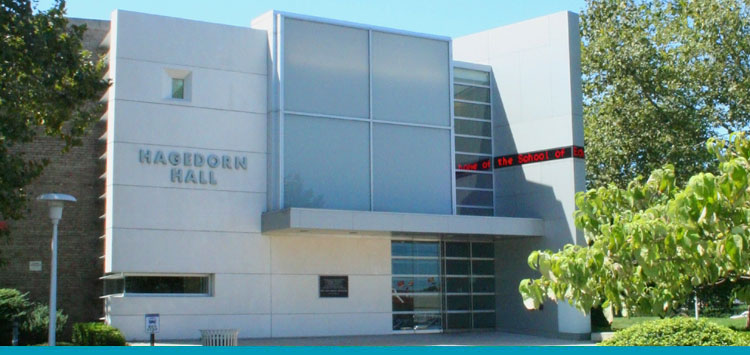In Focus: Liana Rosenman
What made you pursue teaching as a career?
My whole family is involved in education. My mother teaches in Herricks, NY as an elementary teacher and all of my aunts, uncles, and cousins teach as well. I felt drawn to helping others beginning at a young age. I began volunteering at Temple Beth Torah in Melville, NY when I was thirteen and continued to do so for six years. I also recognized my passion for this field, particularly special education, through services I received because of my own learning disability. I was diagnosed very young and remember going to resource rooms for speech and other services. In high school, I felt very connected to a certain teacher named Mr. Fitze, who taught his students so far beyond what was in textbooks. By senior year of high school, I knew teaching was exactly what I would study in college.
Tell us about what it was like to transfer into Hofstra from Nassau Community College.
When I first graduated from high school, my family and I thought it was best for me to enroll at Nassau Community College for two years. There, I focused on my grades and transitioning to college level coursework. Hofstra was always on my radar, so during my time there, and even actually in high school, I met with Associate Dean Donna Levinson within Hofstra’s School of Education to be sure I was fully prepped to enroll in an education program once I transferred. This was so helpful and reinforced my belief that Hofstra was truly the right place for me.
What was your first placement in a school like?
I completed a 45-hour placement at preschool called Crestwood Day School in Melville, NY. I really enjoyed working with my cooperating teacher. Overall it was a very collaborative experience and I spent time in the classroom finding the best methods, seeing children’s learning theories in real time and reflecting on this in my classes at the School of Education. The best part was seeing my students’ progress from September through June in their drawings and other assignments.
You are a founding member of Project HEAL. What is the mission of the organization and how does it relate to your passion for teaching?
When I was 12, I was diagnosed with Anorexia Nervosa and it was a really dark time for me. It’s such a nightmare to struggle with and it controls how you think, in school and at home. I was lucky enough to meet a close friend names Kristina Saffran while we were in treatment together. While it’s not normally encouraged to become close with others who have eating disorders, Kristina and I really had a positive relationship and pushed each other to get better. We kept in touch and always talked about how important our treatment was, though so many girls cannot afford it. Even more importantly, we thought about how there aren’t enough supports that last through recovery for teen girls. That’s how we came up with the idea for Project H.E.A.L.: Help to Eat, Accept and Live, an organization that provides “scholarships” for people seeking care in a residential-treatment facility. Since 2008, we have granted more than $200,000 in scholarships with awards ranging from $20,000 to $40,000. Much like teachers, we try to mentor our recipients and encourage them to be confident in order to learn better.
To date, we have sent 7 women to treatment, ranging from age 12 to 35 and we keep in contact will all who are involved. With the help of many friends, family, and consultants on our admissions committee, we’ve even branched out to facilitate 20 new Project H.E.A.L. chapters outside of New York and even in Canada. Kristina and I are always looking for additional volunteers and other leaders who want to participate. This is such an important cause and not only is it one that incorporates educating others, it allows our scholarship recipients to recover and go on to reach their professional goals. For more information, we invite interested individuals to contact projectHEAL.ed@gmail.com.
What are your long-term goals?
I’ve always known that I wanted to be a special education teacher. I do love working in traditional classrooms too, but because of my own obstacles and the support I’ve received through K-12, I feel I have a great understanding of this population and that much more compassion for serving students with such needs. Also, working in a special education class often includes working with teacher aides and collaborating with a team to reach educational goals. I’ve reflected on both my time in the School of Education at Hofstra and my experience with Project Heal and the field of Special Education really is the perfect match.
Have you found mentors in professors at Hofstra?
The first person that comes to mind when I think of mentorship is Professor Janine Craig who stressed the important of classroom management. She was always so relatable and had tons of experience to share when we had class discussions. With a background in speech pathology and passion for advocating for those with learning disabilities truly made me look to her as a model teacher. In total, there were 12 people in her class so we had a little close-knit community, which was great as I entered the School of Ed. On our last day of class, we even had a celebration and everyone brought in healthy snacks (appropriate for the classroom), and reflected on the whole course.
I have also enjoyed working with Dr. Esther Fusco so much. She has been incredibly helpful with advisement, particularly for me because I transferred into the program, and I am learning so much in her course this semester. She gives great material that I could see myself using in my own classroom one day. Dr. Fusco incorporates her own experiences into the course and you can tell that she really is a model teacher. I’ve created a portfolio based on all that I’ve learned with her and am extremely grateful to have had such a caring professor who truly supports each student.
Do you have any advice for students thinking of majoring in Education?
Just one small piece of advice for future teachers: choose a co-major in a strong content area like Math, English, History or one of the Sciences because it definitely makes you more marketable. Sometimes students are intimidated by more rigorous majors like these, but I think my History co-major has really prepped me well and will benefit me when searching for jobs after graduation.

